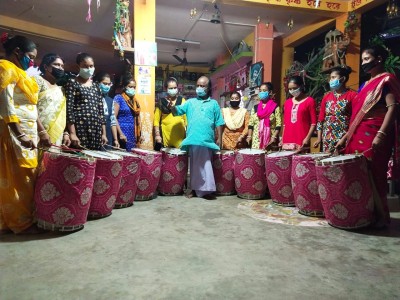

 By Soudhriti Bhabani
By Soudhriti Bhabani
Kolkata, Sep 5 : What 53-year-old Gokul Chandra Das ‘dhaki’ had started about 10 years ago, has now snowballed into a silent movement for women empowerment in the impoverished stretches of West Bengal’s North 24 Parganas district.
Das, who had started training with only six female members of his family in 2010, inspired village women to take on a profession traditionally dominated by male members, has now developed a troop of over 80 women ‘dhakis’ (drummers) in Machlandapur’s Bidhan Pally.
The journey was not that easy. These women, aged between 13 and 46 years had to brave social barriers to venture into the field of drumming. But people like Nipa Mondal, Sangeeta Das, Puja Biswas and Sumita Das made it possible and pulled it off with an ease while also dealing with the hostile attitude of their neighbours who frown upon the unusual choice.
Playing the grand beat instrument of ‘dhak’ — an improvised drum played during religious festivals in Bengal is a profession dominated primarily by men. This is because the nature of the job is physically exhausting given the weight and size of the instrument. A standard wooden ‘dhak’ weighs nearly between 12 to 13 kg. ‘Dhakis’ sling it over their shoulders and dance along with the rhythm of the huge membranophone instrument.
“During my US tour in 2010 with Indian tabla virtuoso Ustaad Zakir Hussain, I visited a music store there and saw a lady playing a number of instruments. It struck me. I thought why can’t our girls play ‘dhak’ and take it up as a musical profession. I came back to my village and started training with only six members from my family,” said Das.
The sound of ‘dhak’ beats, he added, spread pretty fast in the surrounding pockets of the district. Soon the small troop of six women ‘dhakis’ was joined by many others from various rural pockets of Machlandapur, Gobardanga, Habra and Duttapukur and it gradually snowballed into a group of more than 80 female members now.
All these women belong to poor families in the district and it used to be really difficult for them to meet their ends every day, Das added.
“They were not economically stable. But their lives have undergone a sea change. Thanks to ‘dhak’, they are now going places, two to three hours practice everyday is a must,” he said pointing out the rhythms and beats for different ‘puja’ were specifically mentioned in Purohit Darpan and it was a vital aspect of Shakti puja as missing a beat is considered a sin.
“We never thought of stepping out of our tiny village. We were confined to only domestic chores. But this ‘dhak’ has opened up a whole new horizon for us. We have travelled to many big cities like Delhi, Mumbai, Bangalore, Assam, Odisha, etc. Some of us have even travelled to foreign shores to play ‘dhaks’. This was something unimaginable for all of us,” said Nipa Mondal, who is playing ‘Dhak’ for the past seven years. Initially, it looked like a break from her mundane life but with time it became her passion, she added.
Mondal said not only travel, but she has been able to earn money with respect and support her family and education for her children.
Same is the story with Sangeeta Das, daughter of Gukul Chandra who wants to take up playing ‘dhak’ professionally in the years to come.
“I have completed my graduation. Now I have decided to take it up as a profession. I want to carry forward the tradition of playing ‘dhak’ in Bengal, a musical legacy created by our forefathers. My father had also learnt the technique from my grandfather Motilal Das who is no more now,” she added.
After Gukul Chandra started the silent revolution by inspiring women for playing ‘dhaks’, many others have also opened training centres across various districts of East Midnapore, Nadia, Sodepur, Arambag in Hooghly and Murshidabad training women dhakis in villages.
“This is the biggest take away for me. I will not be around, say after 10 or 20 years from now. But my effort will continue to inspire many in the time to come,” said Gukul with a smile on his face.
Disclaimer: This story is auto-generated from IANS service.

